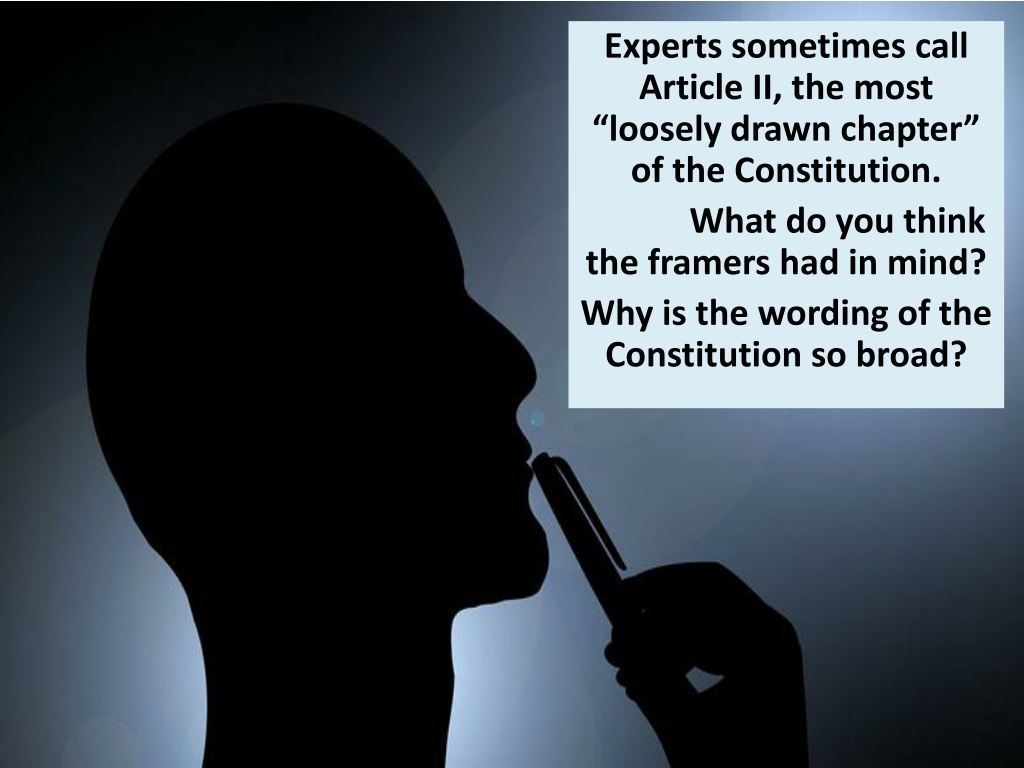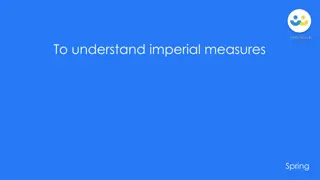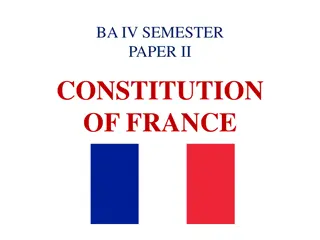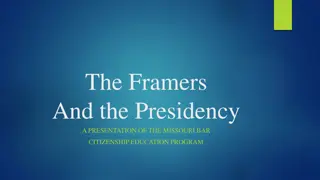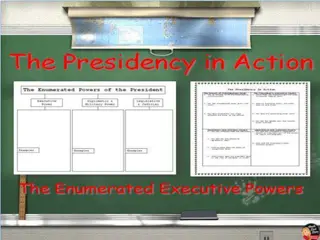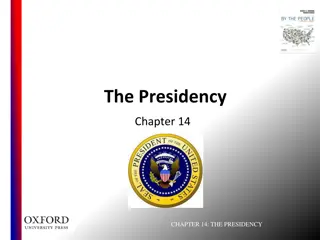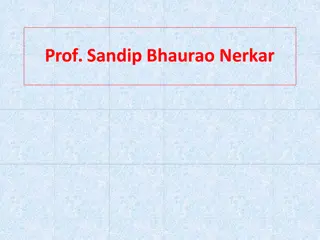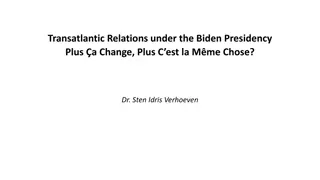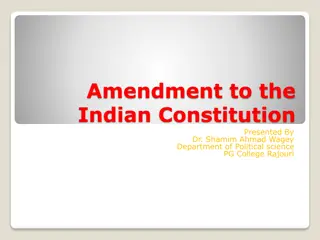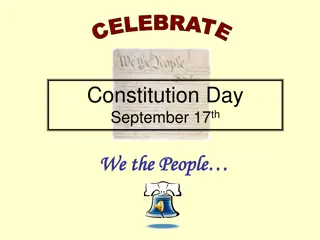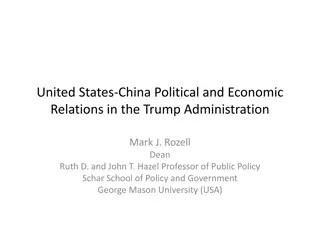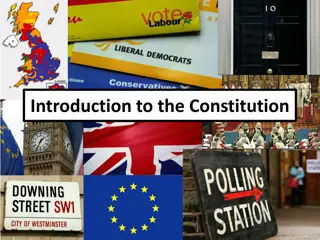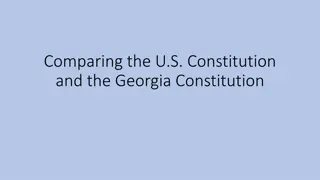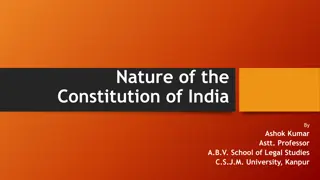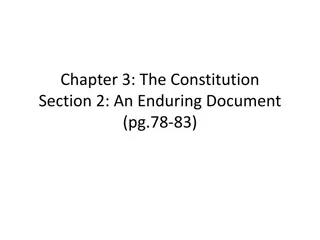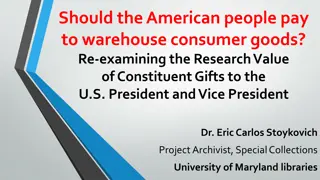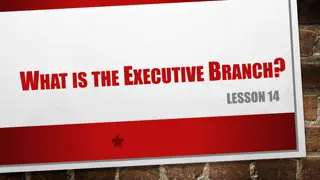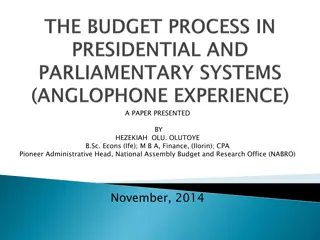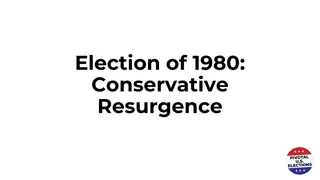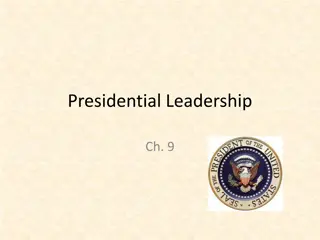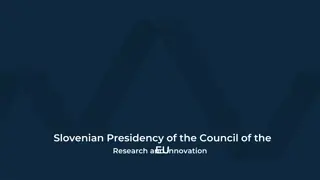Understanding Presidential Power and the Imperial Presidency in Article II of the Constitution
Article II of the Constitution, often seen as loosely drawn, grants the President significant powers. This chapter examines the sources of presidential power, both formal and informal, and delves into the concept of the Imperial Presidency, exploring how modern presidents have wielded authority and the implications of their actions.
Download Presentation

Please find below an Image/Link to download the presentation.
The content on the website is provided AS IS for your information and personal use only. It may not be sold, licensed, or shared on other websites without obtaining consent from the author. Download presentation by click this link. If you encounter any issues during the download, it is possible that the publisher has removed the file from their server.
E N D
Presentation Transcript
Experts sometimes call Article II, the most loosely drawn chapter of the Constitution. What do you think the framers had in mind? Why is the wording of the Constitution so broad?
Enquiry Question: How powerful is the president?
Learning Objectives To explain the sources of presidential power, both informal and formal To evaluate the extent to which the presidency may be considered imperial
Where does presidential power come from? TRAFFIC LIGHT TASK: EASY: Complete the table to show which powers of the president are formal or informal. MEDIUM: Explain what each power is. HARD: Give an example from the Obama/Trump presidencies.
Power of the President F/I? Explanation Example Veto power Power to go public Command armed forces Power of persuasion Power of pardon Make executive agreements Appointment powers Issue executive orders Make treaties Issue signing statements Convene Congress Create and use bureaucracy Personality and leadership Make legislative proposals
Learning Objectives To explain the sources of presidential power, both informal and formal To evaluate the extent to which the presidency may be considered imperial
The Imperial Presidency The concept of the Imperial Presidency first came about during the 1960's, and was later made popular by historian Arthur M. Schlesinger Jr., after he wrote a book on the subject entitled The Imperial Presidency . It is a term used to describe the modern executive branch, and the unconstitutional powers the office has gained since the early 1900 s. The book itself was written as a result of Schlesinger's observations of recent Presidents of his time, including Nixon, Coolidge, and Roosevelt, and commented in particular on abuses of executive power in regards to the armed forces. Recently, the Imperial Presidency term has come into usage once again following the Bush and Obama administrations, which took many actions which arguably, qualified them as Imperial Presidencies.
The Imperial Presidency The President wields an enormous amount of power but this does not always make a president imperial it is how he uses this power. Vetoing bills in of itself invests an enormous amount of power in the president. As the number of staff members has increased, so has the amount of people with personal loyalties to the president, thus increasing the influence the president has over his cabinet even further. The constitutional boundaries of the president do not restrict them, because of the powers that the president invokes are often "executive" in nature. From "executive orders" to "executive privilege" the president invokes many powers not granted them in the constitution. During Nixon's presidency, the use of executive privilege to conceal the contents of tapes recorded in the oval office was specifically declared unconstitutional, yet both president Bush and Obama have invoked it on several occasions, usually when concerning the military. Even though the president has many powers inherent through the constitution, the extent to which he stretches them is often called into question. George W. Bush is one example of that. Bush is often though of as an Imperial president as his presence in the Middle-East was unprecedented and unsupported with such ferment in his two term presidency. Many conflicts were not officially wars, as they were on terrorists, and not quite a political group. The decades of war far surpassed the few months that a president is allowed to have non- verified presence in a foreign country on a military basis.
How can you tell if a presidency is imperial ? When appointing Cabinet Use the imperial presidency check list to consider whether a president is imperial. What other things might you look for? Members and other Executive Official, the Senate does not gain a say in the decision Excessive abuse of the military Extension of the war powers Used powers surpass that of the Constitution Branch is expanded under presidential term to a more powerful size
FOCUS: Executive Orders YOUR TASK: Read the article With the stroke of a pen by Kenneth Mayer. Highlight or underline 10 quotes ONLY from the article that summarise the key points. NB: Think about what type of reading approach you will use for this article: skimming/scanning/reading for understanding?
Trump Watch YOUR TASK: Access the list of Donald Trump s Executive Orders https://en.wikipedia.org/wiki/List_of_executive_actions_by_Donald_Trump#Executive_orders Choose an executive order, make sure it is different from the rest of the class. Prepare a 2 minute verbal explanation of the executive order, its impact and whether or not this is evidence of an imperial presidency.
FOCUS: Executive Privilege Definition of Executive Privilege: refers to the assertion made by the President or other executive branch officials when they refuse to give Congress, the courts, or private parties information or records which have been requested or subpoenaed, or when they order government witnesses not to testify before Congress. The assertion is based on the constitutional doctrine of separation of powers, though nothing in the Constitution expressly mentions Executive Privilege. Read the handout to learn about Nixon.
FOCUS: Executive Privilege YOUR TASK: Read each "secret". In the space to the left of the "secret" write "SS" for "state secrets" or "CED" for "confidential executive deliberations." To the right, mark "P" if you think the secret should be protected under executive privilege or "NP" if you think the secret would not be protected. Explain why you think the secret would or would not be protected.
Learning Objectives To explain the sources of presidential power, both informal and formal To evaluate the extent to which the presidency may be considered imperial
Debating Political Ideas YOUR TASK: In pairs you will be assigned a president. One of you will argue for Position A and the other will argue for Position B. You need to identify 5 key arguments (and examples!) to support your position. Work together to discuss the arguments and counter arguments before committing them to your hand-out. You will need to role play your scenario and arguments to the rest of the class.
Debating Political Ideas YOUR TASK: Presidents: Trump, Obama, GW Bush, Clinton, GWH Bush Position A: This president was an imperial president Position B: This president was not an imperial president
Homework Application Task: Debating the Imperial Presidency preparation and research Flipped Learning Preparation Task: The Vice President (Bennett p229-239) Stretch & Challenge Task Article: Don t Just Impeach Trump. End the Imperial Presidency
EXAMPLE RESEARCH & PREPARATION: Listen to the podcast King Obama, King Trump: The Dangers of the Imperial Presidency here. Read the article here.
